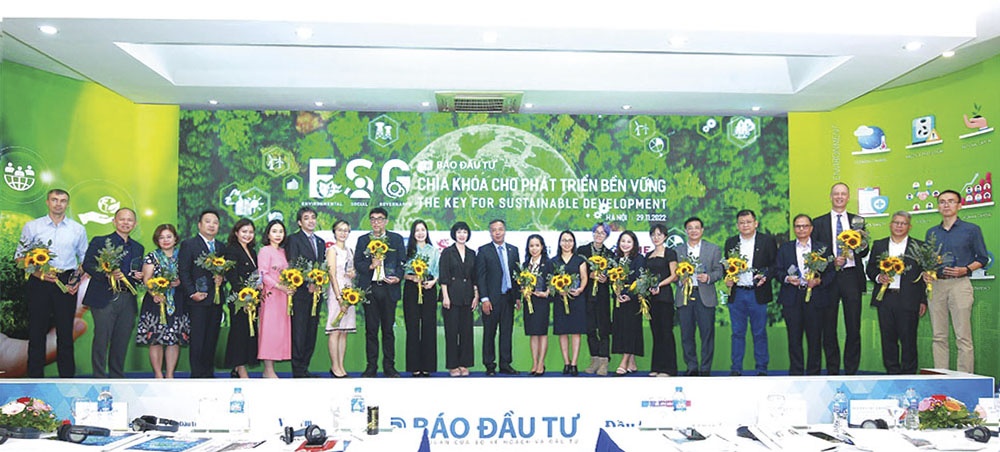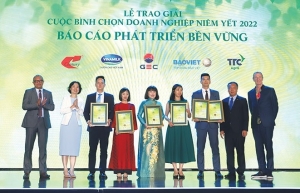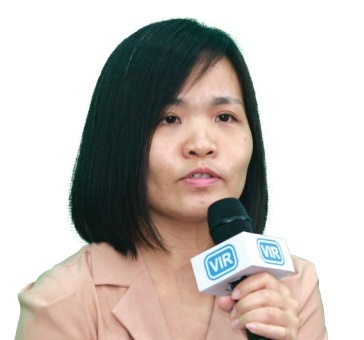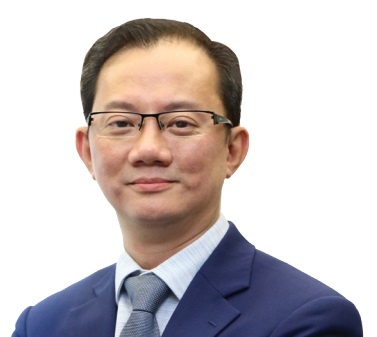Determination on show by businesses to be ESG ready
 |
| Last week’s seminar covered everything ESG, from initial investment considerations to pursuing new values |
The European Union is set to apply a carbon border adjustment mechanism (CBAM) as early as 2023 when European companies must start reporting emissions of imported goods, although they will not need to purchase CBAM certificates until 2026-2027. The Council of the EU and the European Parliament are yet to decide on the exact timeline.
The CBAM would tax imported goods exported to in EU markets on the basis of their carbon content, which depends on their material and energy inputs. The mechanism will initially apply to the highest-emitting industries most at risk of leakage – such as iron and steel, cement, fertilisers, aluminium, and electricity generation – and will likely be expanded to other sectors in the coming years.
“This will affect exporters from Vietnam,” said Nick Wood, senior advisor of FTI Consulting at last week’s seminar on environmental, social, and governance (ESG) considerations held by Vietnam Investment Review in Hanoi.
According to Wood, the EU’s new policy will be among many that will be applied in the future, and the same is also true to many other export markets of Vietnam. “Thus business must well prepare for meeting the EU’s new requirements if they want to continue exporting to this large market,” Wood suggested.
He refers to many solutions for enterprises including, especially, ESG which is now globally paid attention to by all stakeholders including managers, customers, investors, and consumers.
ESG criteria covers a wide range of issues, including climate change and resource efficiency, human rights, labour relations, cybersecurity and privacy, anti-bribery and corruption, and transparency and disclosure. Standards can derive from international law, local law, or soft law standards – for example agreements, principles and declarations that are not legally binding.
“The world is facing complex climate, social, and geopolitical issues and addressing ESG priorities is more important than ever,” said Nguyen Chi Hieu, director of ESG Consulting of KPMG in Vietnam and Cambodia. “Based on their own conditions, enterprises should begin applying related criteria as soon as possible because external and internal risks are getting bigger and bigger. Over the past years, many companies in Vietnam have been developing ESG as a big priority in their activities, and this have helped them improve their competitiveness and ensure sustainable development.”
Great benefits
As a top conglomerate in the ASEAN region in terms of sustainable development, Thailand’s SCG and its member companies have been making efforts to implement its ESG 4 Plus strategy into business activities in order to reach its goals.
In Vietnam’s cement and building materials industry, SCG has introduced green products which have been certified with the SCG Green Choice label. Products such as Super Cement, Song Gianh, and Starcemt not only save energy and resources but also help to reduce emissions.
During the COVID-19 pandemic, SCG’s packaging business also supported 5,000 paper beds for field hospitals and quarantined areas. The initiative helped offer crucial beds for patients while also ensuring environmental friendliness and saving resources.
For the chemicals industry, SCG introduced the eco-plastic SCGC Green Polymer, which is designed according to the principle of the circular economy to improve eco-efficiency. After using them, the materials of SCGC Green Polymer eco-plastic will be recovered and recycled for new value, thereby creating a new plastic lifecycle to meet the goal of going green.
“Vietnam is now full of potential for SCG and we will continue investing here into high technology so as to reduce energy consumption in production activities,” said president and CEO Roongrote Rangsiyopash.
Other recent related initiatives in Vietnam also include HSBC committing to arranging up to $12 billion sustainable financing for Vietnam by 2030; and the Ho Chi Minh City and Hanoi stock exchanges have launched the Vietnam Sustainability Index to recognise and promote the best ESG practices implemented by publicly listed companies in Vietnam.
Manufacturing group Hoa Phat, meanwhile, is using the huge amount of excess heat from the steel-making process to produce electricity, which covers up to 80 per cent of the electricity needed for its production.
Patrick Haverman, deputy resident representative of the United Nations Development Programme in Vietnam, said that ESG can bring huge benefits to businesses.
“Companies and investors are increasingly working together to address major global challenges. The adoption of ESG considerations in private investments is evolving from a risk management practice to a driver of innovation and new opportunities that create long-term value for business and society,” Haverman said. “Promoting ESG adoption throughout the investment value chain can encourage greater private investment in sustainable development, resulting in greater impact.”
According to Haverman, various actors in the investment value chain, including investors, banks and companies, have been increasingly including ESG and sustainability information in their reporting processes. It will be important to create an enabling environment for sustainability and integrated reporting to flourish.
He added that there is no reason to see real alignment with the UN’s Sustainable Development Goals (SDGs) as anything else than good business. According to the Business Commission on Sustainable Development, contributing to and achieving the SDGs offer a compelling growth strategy for businesses and for the world economy as a whole.
The American think-tank Council on Foreign Relations also said that achieving gender equity alone could increase the size of the global economy by 26 per cent, and a $12 trillion annual business opportunity could be unlocked if the SDGs were pursued in just four major sectors or investment systems - food and agriculture, cities, energy and materials, and health and wellbeing.
Tough work to come
In Vietnam, the government is working to develop requirements on disclosing information on environmental activities. Public enterprises are required to publish data on their social and environmental performance.
“Although, for other businesses, disclosure of quantitative ESG-related data in companies’ sustainability reports is still voluntary, so there is a clear need for this,” said Hieu of KPMG. “In addition, there are increasing calls for Vietnamese businesses to make their commitments to achieve net-zero emissions and quickly implement more important solutions in reducing carbon, based on Vietnam’s recent commitments to hit net-zero.”
However, experts have pointed out a series of difficulties for the application of ESG. “Enterprises would need initial investment for implementing related priorities. ESG will also change people’s habits which will cause difficulties during deployment, especially in the context that the companies have got used to focusing on traditional habits during performance,” said Bui Trung Kien, deputy chairman of renewables and energy-saving solutions group CME Solar.
“Pursuing ESG values would require big and strong determination, but after heavy investment on this issue, companies will be able to reduce risks and improve prestige,” Kien said at last week’s seminar.
“This will also help enterprises find it easier to obtain bank loans and expand exports. Many companies in the EU and the US have required their overseas partners, including those from Vietnam, to apply ESG standards. For example, the EU’s CBAM will greatly pressure many exporters from inside Vietnam.”
According to a study involving 234 companies in Vietnam, carried out earlier this year by both PwC Vietnam and the Vietnam Institute of Directors, ESG concerns were front and centre for businesses.
Under the study, two-thirds of respondents admitted difficulties due to absence of transparent regulations, while 61 per cent cited difficulty in embedding ESG in existing enterprise framework. PwC Vietnam suggested that clear guidelines, a holistic country roadmap, and a level playing field for industries are needed for businesses to advance their ESG strategies.
While the government has made progress, more can be done. For instance, many are waiting for Vietnam’s policymakers to offer clarity around the country’s green finance rules and target areas, PwC said.
| Nguyen Thi Thanh Nga - Expert, Department of Science, Education, and Natural Resources, MPI
ESG is a sure-fire approach to achieving green growth and net-zero. As a state management and lead agency for green growth and sustainable development, the MPI has issued the National Action Plan on Green Growth, providing 10 strategic orientations and eight solutions across various industries and fields, highlighting the role of businesses. The Ministry of Planning and Investment (MPI) in cooperation with the UNDP promotes inclusive businesses in the fields of agriculture and food processing. Recently, a National Assembly delegation participated in the ASEAN Inter-Parliamentary Assembly to put the issue on the agenda of the ASEAN parliamentary delegation. The MPI promotes sharing experience and institutionalising ESG approaches. Countries in ASEAN need a common criteria framework for businesses to approach ESG, facilitating trade between the bloc and other countries. ESG is a more updated version of the new trend of net-zero goals, social responsibilities, environmental protection, and a better version of sustainable business practices. For Vietnam, this is a new and difficult issue, so it is necessary to spread ESG into the business community so that it can understand the actual nature of their normal business practices that have contributed to ESG, in both large and micro enterprises, both foreign-invested and domestic enterprises. Hoang Thi Thanh Thuy - Director of International Business TH Group
The Vietnamese agricultural sector has grown tremendously, from producing sufficient food to meeting the needs of nearly 100 million people, and to exporting goods worth nearly $50 billion a year. We have also witnessed the strong development of many enterprises in the agricultural sector, including TH Group. The government is developing agricultural infrastructure, and promoting the participation of private firms in investment, development, and application of scientific and technological achievements in agricultural production and expansion of the public-private partnership model. In addition, the government is also promoting the application of digital technology in agricultural value chains. At TH, we are taking the lead in this field. To build a sustainable ecosystem, since 2008, TH Group has applied green technologies with a large amount of grey matter such as digital technology, cloud technology, AI, and governance science to achieve the best efficiency in using resources. TH Group’s production model is a closed circular economic model: all organic matter and organic waste from livestock farms are collected and processed into biological buffers in service of the farm and used to make organic fertilisers. Animal husbandry wastewater is used to improve arable land and return to the natural environment after being treated up to standards. TH has also invested in rooftop solar energy, which both produces electricity and reduces heat absorption for the roof of the barn, increases animal welfare, and reduces heat stress for cattle in summer. Supa Waisayarat - Country director, Super Energy Corporation Vietnam
We aim to operate in green businesses which have less impact on society and the environment, like solar, wind, and hydrogen energy. Furthermore, we are continuing to improve the investment and business environment as a whole to enhance competitiveness and attract more investment. Therefore, all activities that focus on the environment, society, and good governance are our targets in next year and thereafter. With the generation capacity of 886MWp from our solar and wind energy plants, we produced approximately 2GWh of electricity from the beginning of this year, and have contributed to reducing carbon emissions of about 1.5 million tonnes in Vietnam. Tran Dao Duc - Deputy general director CEO Group
Although ESG is a relatively novel concept for Vietnamese businesses, associated regulations have become increasingly apparent, and the awareness of people and businesses has been constantly improved. In recent years, we have been making strides to ensure that our projects meet the requirements set on the environment when in the development pipeline. For example, air conditioners for real estate projects will use the best cooling solvents to protect the environment, along with the use of inverter systems to ensure energy savings towards reducing greenhouse gas (GHG) emissions. During a project’s implementation, equipment suppliers to CEO group will be asked about how this equipment, in addition to the optimal price, will contribute to ensuring the project would be greener and more economical. Although CEO Group has no specific roadmap for ESG implementation, the Board of Directors is striving to concretise associated criteria in the group’s development strategy. To support companies in ESG implementation, businesses expect the government to provide specific regulations, accompanied by necessary instructions and support to materialise the government’s commitments towards the international community. Nguyen Chi Hieu - Director, ESG Consulting KPMG in Vietnam & Cambodia
Recently, KPMG conducted a study on sustainable development, which is the first time Vietnam has participated in this research. We see a lot of growth in the ESG journey along with the businesses’ growth journey. ESG is not a trend but it is really necessary for the long-term development of businesses. Regarding the environment, when the government committed to net-zero, enterprises are the main object in the transformation of the economy. In Vietnam, some enterprises have clear development strategies, baselines, criteria, and goals for each period. Regarding social criteria, it can be to improve human freedom and raise the benefits and welfare of employees. In terms of governance, it could be a commitment to fighting corruption, not investing in political activities. Foreign-invested enterprises are very interested in ESG and Vietnamese enterprises have also begun to pay attention and follow. However, this begins with measuring and reducing emissions, biodiversity, data privacy, and others. These factors make enterprises more transparent and attract more investors. Darrell Oh - General director Pfizer Vietnam
At the heart of Pfizer’s ESG approach is the simple idea that our values and commitment to long-term sustainability are the way we strive to fulfill our purpose – breakthroughs that change patients’ live, build trust, and take accountability for the impact we make on society. ESG issues are increasingly a priority to our stakeholders, and we recognise the impact of environmental issues on society and public health. We seek to harness our cutting-edge science to create a healthier, more equitable world, and we are deeply committed to acting ethically, thoughtfully, and responsibly in all that we do. In June, Pfizer announced an intent to take even more ambitious action, adopting the voluntary net-zero standard. This standard urges long-term action to reduce company emissions by 95 per cent and value chain emissions by 90 per cent. Pfizer aims to achieve net-zero by 2040, 10 years earlier than standard expectations. As part of Pfizer’s purpose, we are working to mitigate the further effects of climate change on the environment and on human health. Our efforts alone, however, will not create the level of action needed to address it. We recognise the need for action by all sectors, public and private, and commit to partnering to address climate change across our value chain. Joseph Low - President (Vietnam) Keppel Land
Keppel Land is commemorating 30 years in Vietnam this year. Over the years, the company has contributed to Vietnam’s urbanisation by offering high-quality and sustainable urban space solutions that enrich people and communities. We will continue to advance our sustainability capabilities and pursue business opportunities, especially in sustainable urban renewal. We are guided by Keppel’s Vision 2030 – the group’s long-term strategy to guide its growth and transformation with sustainability at its core. We are making sustainability our business by providing solutions that contribute to sustainable urbanisation and combatting climate change. Keppel Land has taken significant strides forward for sustainability lately, including announcing our targets to halve our absolute scope 1 and 2 GHG emissions from 2020’s level by 2025, and achieve net-zero by 2030. We are also contributing to greening the built environment with our suite of sustainable, smart urban space solutions. In Vietnam, Keppel Land is looking to implement sustainable urban renewal technologies at our projects, and we will work with best-in-class local and international partners to incorporate innovative urban solutions such as smart security, smart mobility, and environmental infrastructure solutions into our projects. Through the deployment of smart building technologies and innovations, we can further offer enterprise solutions and create attractive propositions with a customer-centric approach. |
 | Listed companies lean into ESG conventions The mounting acceleration of sustainability and ESG-related criteria have been among the major concerns among financial markets, and Vietnamese organisations are allocating more resources towards improving their resilience. |
 | Hospitality industry joins ESG Environmental, social, and governance criteria are still a new concept for most tourism and hotel businesses in Vietnam, but the success stories of a number of pioneering brands have contributed to inspiring businesses to embrace them more, with several companies picking up awards at a seminar organised by Vietnam Investment Review last week. |
What the stars mean:
★ Poor ★ ★ Promising ★★★ Good ★★★★ Very good ★★★★★ Exceptional
Related Contents
Latest News
More News
- Ho Chi Minh City launches plan for innovation and digital transformation (February 25, 2026 | 09:00)
- Vietnam sets ambitious dairy growth targets (February 24, 2026 | 18:00)
- Masan Consumer names new deputy CEO to drive foods and beverages growth (February 23, 2026 | 20:52)
- Myriad risks ahead, but ones Vietnam can confront (February 20, 2026 | 15:02)
- Vietnam making the leap into AI and semiconductors (February 20, 2026 | 09:37)
- Funding must be activated for semiconductor success (February 20, 2026 | 09:20)
- Resilience as new benchmark for smarter infrastructure (February 19, 2026 | 20:35)
- A golden time to shine within ASEAN (February 19, 2026 | 20:22)
- Vietnam’s pivotal year for advancing sustainability (February 19, 2026 | 08:44)
- Strengthening the core role of industry and trade (February 19, 2026 | 08:35)








 Tag:
Tag:



















 Mobile Version
Mobile Version